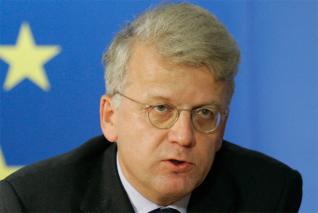Margarita Antidze
 On December 12, EU observers in Georgia called upon the Russian army to leave Georgian village and stated that detention on both sides of de-facto border of South Ossetia complicates the situation.
On December 12, EU observers in Georgia called upon the Russian army to leave Georgian village and stated that detention on both sides of de-facto border of South Ossetia complicates the situation.
225-member EU Mission deployed in Georgia one year ago. It happened after 5-day war in August, 2008 when Russia made devastating response to Georgia’s attack on break-away region of South Ossetian.
Head of the Mission, Hansiorg Haber reported to the Reuters that cooperation with satellite center improve the possibility to observe South Ossetia. Unarmed observes of the EU are not allowed into the break-away region. Russia still breaches the cease-fire agreement signed as a result of EU mediation which obliged every party to the conflict to return to pre-war positions.
The war broke out in the region which is on the cross-road of the key energetic routs going towards the west. Two months after the war, Russian army retreated from buffer zones of Georgia but Russian soldiers still stayed in one of the Georgian villages from buffer zone Perevi. It astonishes Georgian side.
Russia recognized the independence of South Ossetia and another break-away region of Georgia Abkhazia and states that based on the agreements with both regions, Russia can deploy several thousands of soldiers there.
“Even if you receive this interpretation, Russia breaches the ceasefire because the checkpoint is in Prevei which is beyond the border of South Ossetia,” said Haber. “I think it is time to resolve this problem.”
Russian army left Perevi on December 12, 2008 but returned back on the same day after Georgian army entered there. The village is located to the west of South Ossetia.
In September of 2009 the mission mandate was renewed for one more year. Haber thinks, the mandate will continue in future too. He said the monitors improved their cooperation with European Satellite Center that is kind of compensation for them when they cannot enter South Ossetia.
“We can check part of the information at some point provided by the second party. However, trust-building between Georgia and two break-away regions is still serious problem which is complicated by the detentions on Georgia-South Ossetia border though it is not clearly defined,” said Haber. “Trust-building between the parties is our function but this process is developing unequally on Abkhazian and Ossetian territories. There are some practical problems on the place, particularly, in South Ossetia where people are detained on both sides of the administrative border. I think if we resolve this problem, we will succeed in trust-building too.”
Last week, as a result of the European mediation two Georgian adults were released from Tskhinvali. On its side, Georgia released 5 Ossetian detainees who were initially released by the court but Georgian police kept them in custody for four months.
Source: http://www.foreignpress.ge/
See original text on:



